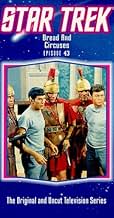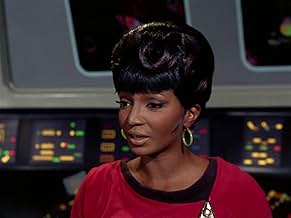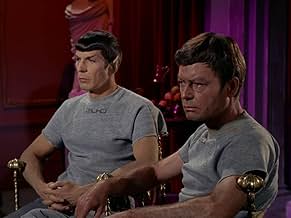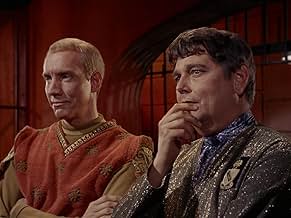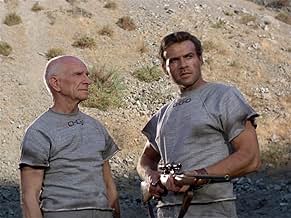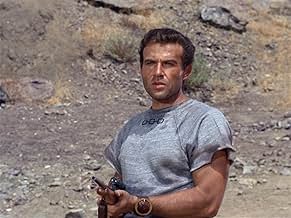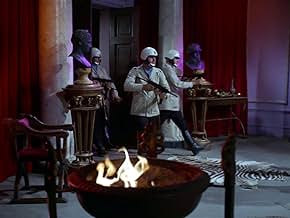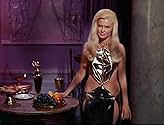Bread and Circuses
- Episode aired Mar 15, 1968
- TV-PG
- 50m
IMDb RATING
7.0/10
3.6K
YOUR RATING
The Enterprise crew investigates the disappearance of a ship's crew on a planet that is a modern version of the Roman Empire.The Enterprise crew investigates the disappearance of a ship's crew on a planet that is a modern version of the Roman Empire.The Enterprise crew investigates the disappearance of a ship's crew on a planet that is a modern version of the Roman Empire.
Bart La Rue
- Announcer
- (as Bart Larue)
Paul Baxley
- Policeman #1
- (uncredited)
Bill Blackburn
- Lieutenant Hadley
- (uncredited)
Frank da Vinci
- Lt. Brent
- (uncredited)
Featured reviews
This was a pretty cool episode. It followed the tried and true formula of going back into what essentially is an exploration of earth's history. The Romans are more like Nazis but it works pretty well. I was surprised while watching this one last night that I didn't recall ever having seen it before, at least not all of it. This doesn't rate as a classic offering of the first Trek series but it was interesting and fun. The guys encounter an alien society that has patterned itself after ancient Rome, complete with televised gladiator battles to the death. Spock gets a chance to display his nifty swordsmanship while McCoy shows why hes a doctor, not a gladiator(although he does whack one dude with a mean karate chop during a jail escape). Spock has to endure a chopping lecture about being human from McCoy as well. Lots of McCoy in this one kids. Overall, this is not one of the very best episodes but still a ton of fun. Hey, you actually get to see the crew dice up some bad guys with swords at the end. This is absolutely one of the most violent Treks. By far!!!!! Also, Kirk gets to bed down with a sizzling hot slave girl due to the Romans respect for the Captain's "manliness". You go Kirk....little wonder the Captain was smiling on the bridge at the end of this one!!!! Whoa
Although Star Trek's "Prime Directive" had been mentioned in episodes prior to "Bread and Circuses", that philosophical tenet of the Star Trek universe is the focus of this episode, where it is fully laid out for the first time.
Captain Kirk and crew happen upon--what else--an Earth-like planet where Spock's research shows that another Starfleet ship was supposedly destroyed. Oddly, the planet also happens to have exactly the same land to water ratio as the Earth as well as the same chemical composition of air. Before beaming down they also intercept broadcasts that show the civilization to be a close parallel to ancient Rome--particularly in terms of a proclivity towards violence, including violence as entertainment. Of course, once they beam down, Kirk, Spock and McCoy end up as captives.
Enter the prime directive. There are probably not many reading this who are not familiar with it, but in a nutshell, it's a Starfleet philosophy of non-interference. In the course of their explorations, the aim is to study other civilizations, but to not take any actions which might amount to culture shock, and even more strongly, to not take any actions which might catalyze socio-cultural development in any directions other than what they would have been without interaction with Starfleet. Of course, there are a lot of problems with this idea, and even within the Star Trek world, Starfleet members are hardly consistent in applying the principle. We can safely guess that Star Trek writers tended to not be very familiar with ideas in science and philosophy of science which posit that any outsider interaction will necessarily affect the cultures being studied in some way, and they probably weren't very familiar with either chaos theory and the butterfly effect, or even Eugene Wigner's interpretation of quantum mechanics (in which the observer and his/her consciousness plays a significant role in the events that occur). But soundness of the Prime Directive in the real world aside, we receive a lesson in what it is and what it means to the Star Trek crew in "Bread and Circuses".
To an extent, I have to wonder if the Prime Directive wasn't further developed here in the way that it was merely as a plot device. It's a way of extending the conflict. Otherwise, the tendency is to think, "Why wouldn't Scotty send down crew members to just blast the hell out of Kirk, Spock and McCoy's captors?" Although the primitive culture had guns, they are still a primitive culture.
But it doesn't really matter if the Prime Directive is just a means of extending the dilemma for 40 minutes or so. The Prime Directive is a good idea; one that we can pretend is more sound in the Star Trek universe, and one that proved to be fruitful for many future episodes in different Star Trek series.
So this episode is both important and enjoyable. We get some different locations, some interesting one-time ideas--especially the televised gladiatorial events, and I always get a kick out of the fighting episodes. Part of the original Star Trek's charm is its cheesiness, and physical combat is one of the primary sources of cheese. Also notable are the unusual references to religion--this happens a few times in the series, but nowhere more strongly than this episode. There is also a lot of exquisite bickering between Spock and McCoy here, including McCoy mocking Spock's penchant for logic by making his own Spock-like statements and Spock responding by insulting McCoy's medical ability.
Captain Kirk and crew happen upon--what else--an Earth-like planet where Spock's research shows that another Starfleet ship was supposedly destroyed. Oddly, the planet also happens to have exactly the same land to water ratio as the Earth as well as the same chemical composition of air. Before beaming down they also intercept broadcasts that show the civilization to be a close parallel to ancient Rome--particularly in terms of a proclivity towards violence, including violence as entertainment. Of course, once they beam down, Kirk, Spock and McCoy end up as captives.
Enter the prime directive. There are probably not many reading this who are not familiar with it, but in a nutshell, it's a Starfleet philosophy of non-interference. In the course of their explorations, the aim is to study other civilizations, but to not take any actions which might amount to culture shock, and even more strongly, to not take any actions which might catalyze socio-cultural development in any directions other than what they would have been without interaction with Starfleet. Of course, there are a lot of problems with this idea, and even within the Star Trek world, Starfleet members are hardly consistent in applying the principle. We can safely guess that Star Trek writers tended to not be very familiar with ideas in science and philosophy of science which posit that any outsider interaction will necessarily affect the cultures being studied in some way, and they probably weren't very familiar with either chaos theory and the butterfly effect, or even Eugene Wigner's interpretation of quantum mechanics (in which the observer and his/her consciousness plays a significant role in the events that occur). But soundness of the Prime Directive in the real world aside, we receive a lesson in what it is and what it means to the Star Trek crew in "Bread and Circuses".
To an extent, I have to wonder if the Prime Directive wasn't further developed here in the way that it was merely as a plot device. It's a way of extending the conflict. Otherwise, the tendency is to think, "Why wouldn't Scotty send down crew members to just blast the hell out of Kirk, Spock and McCoy's captors?" Although the primitive culture had guns, they are still a primitive culture.
But it doesn't really matter if the Prime Directive is just a means of extending the dilemma for 40 minutes or so. The Prime Directive is a good idea; one that we can pretend is more sound in the Star Trek universe, and one that proved to be fruitful for many future episodes in different Star Trek series.
So this episode is both important and enjoyable. We get some different locations, some interesting one-time ideas--especially the televised gladiatorial events, and I always get a kick out of the fighting episodes. Part of the original Star Trek's charm is its cheesiness, and physical combat is one of the primary sources of cheese. Also notable are the unusual references to religion--this happens a few times in the series, but nowhere more strongly than this episode. There is also a lot of exquisite bickering between Spock and McCoy here, including McCoy mocking Spock's penchant for logic by making his own Spock-like statements and Spock responding by insulting McCoy's medical ability.
What makes this episode memorable to me after nearly forty years is not the tired, clumsy gladiator swordfights -- and certainly not the historically dubious tributes to Christianity as a religion of peace.
The power of this episode actually comes from the backstory of the minor villain, Merrick aka "Mericus." The real theme of this episode is the redemption of a man who once dreamed of being a Starship Captain, like Kirk, but was doomed by a single moment of cowardice to a lifetime of self-loathing. This is basically a retelling of LORD JIM by Joseph Conrad, with perhaps a dash of THE SHORT HAPPY LIFE OF FRANCES MACOMBER by Ernest Hemingway.
The clues come right away that Merrick is disgusted with himself. He's supposed to be questioning Kirk but really he's the one begging to be heard out, to be absolved. "Lots to talk about, Jim. Lots to explain." Later, when Kirk is absolutely ice-cold under pressure, watching Spock and McCoy face death in the arena, Merrick helpfully points out, "Proconsul, he commands not only a space ship, but a star ship. A very special ship, and crew. I once tried for such a command." Poor Merrick does everything but break down and bawl here. "I coulda been a contendah!"
The truly vile specimen in this episode is the proconsul, a fat little man who never gets tired of rubbing salt in Merrick's wounds. Watch how he makes Merrick pat Kirk down for weapons like a flunky. And listen for that little dig, "the thoughts of one man to another cannot possibly interest you, Merrick." All this stuff is a lot more hateful -- and closer to everyday life for most of us -- than sending men to die in the arena. And it's all the more grim in that this repulsive punk of a proconsul is still alive at the end, and will presumably live to die in bed, evil and unpunished. Tough stuff.
But in the end, what real uplift this episode provides is not Uhura's asinine speech about "The Son" but watching Merrick grab that communicator and shout, "Enterprise, lock on to this transmission. Three to beam up -- ACK!!!!"
Merrick lived a coward, but dies a hero -- in a tragic ending worthy of Conrad.
The power of this episode actually comes from the backstory of the minor villain, Merrick aka "Mericus." The real theme of this episode is the redemption of a man who once dreamed of being a Starship Captain, like Kirk, but was doomed by a single moment of cowardice to a lifetime of self-loathing. This is basically a retelling of LORD JIM by Joseph Conrad, with perhaps a dash of THE SHORT HAPPY LIFE OF FRANCES MACOMBER by Ernest Hemingway.
The clues come right away that Merrick is disgusted with himself. He's supposed to be questioning Kirk but really he's the one begging to be heard out, to be absolved. "Lots to talk about, Jim. Lots to explain." Later, when Kirk is absolutely ice-cold under pressure, watching Spock and McCoy face death in the arena, Merrick helpfully points out, "Proconsul, he commands not only a space ship, but a star ship. A very special ship, and crew. I once tried for such a command." Poor Merrick does everything but break down and bawl here. "I coulda been a contendah!"
The truly vile specimen in this episode is the proconsul, a fat little man who never gets tired of rubbing salt in Merrick's wounds. Watch how he makes Merrick pat Kirk down for weapons like a flunky. And listen for that little dig, "the thoughts of one man to another cannot possibly interest you, Merrick." All this stuff is a lot more hateful -- and closer to everyday life for most of us -- than sending men to die in the arena. And it's all the more grim in that this repulsive punk of a proconsul is still alive at the end, and will presumably live to die in bed, evil and unpunished. Tough stuff.
But in the end, what real uplift this episode provides is not Uhura's asinine speech about "The Son" but watching Merrick grab that communicator and shout, "Enterprise, lock on to this transmission. Three to beam up -- ACK!!!!"
Merrick lived a coward, but dies a hero -- in a tragic ending worthy of Conrad.
While this is an enjoyable episode, one of the things that sets it apart is that it has some great lines in it.
"Doctor, if I were able to show emotion, your new infatuation with that term would begin to annoy me."
"Really, Doctor? I had no idea they were trained. Watching you, I assumed it was trial and error."
"You bring this network's ratings down and we'll do a special on you!"
"Fight, you pointed-eared freak!"
"I'm trying to thank you, you pointy-eared hobgoblin!"
"Oh...we've preempted 15 minutes on the early show for you...in full color. I guarantee you a splendid audience."
If nothing else, this episode gets high marks for the script.
"Doctor, if I were able to show emotion, your new infatuation with that term would begin to annoy me."
"Really, Doctor? I had no idea they were trained. Watching you, I assumed it was trial and error."
"You bring this network's ratings down and we'll do a special on you!"
"Fight, you pointed-eared freak!"
"I'm trying to thank you, you pointy-eared hobgoblin!"
"Oh...we've preempted 15 minutes on the early show for you...in full color. I guarantee you a splendid audience."
If nothing else, this episode gets high marks for the script.
Season 2, episode 25. The Enterprise is on it's routine patrol when it runs across some wreckage of the SS Beagle. The Beagle has been lost for 6 years and it's captain was R. M. Merik, a man Kirk once knew. They find no signs of humans so they guessed that the crew was able to leave the ship before it was destroyed. They follow the debris trail to an unknown planet - never charted before. They discover the planet is very much like planet Earth and even pick up radio and video signals from it. The ship's computer picks up survivors from the Beagle on the planet. Kirk, Spock & McCoy beam down to the planet's surface and are soon met with a group of men with shotguns - they are runaway slaves. Kirk, Spock and McCoy befriend the runaway slaves. It is revealed that their slavery is over a belief or dispute of gods: sun god vs other gods. Kirk is looking for Captain Merik the slaves have mentioned a man named Merikus - is it one in the same man? The planet is similar to Earth's ancient Rome but mixed with 20th century Earth and soon they find themselves in a 20th century jail cell while searching for Merik... they soon find Merik. Merik takes them to the pro-council where Merik explains what happened to him, his crew and the Beagle. Later Kirk is made to order some of his crew members down to fight in the old Roman style arena. He tells Mr. Scott code green, all is well. Scotty knows that means trouble, don't interfere but stand by. Kirk refused to bring down his men so Kirk, Spock and McCoy are taken to the arena in a real fight to the death which is broadcasted on television. The Enterprise can pick up television signals which is in their favor but must stand-by under the captain's orders - Scotty cannot send down a landing party but he can do other things from the ship.
There are some excellent moments between Spock and McCoy - and we are able to learn a bit more about Mr. Spock. Yes Spock does worry about Kirk just like the very human Dr. McCoy.
9/10
There are some excellent moments between Spock and McCoy - and we are able to learn a bit more about Mr. Spock. Yes Spock does worry about Kirk just like the very human Dr. McCoy.
9/10
Did you know
- TriviaThe caves where the Children of the Sun hide out are one of the most-used locations in television and movies. In addition to being the entrance to Batman (1966)'s Batcave, they are also seen in Invasion of the Body Snatchers, Kung Fu (1972) and various police and western shows. They are located right below the famous Hollywood sign.
- GoofsDr. McCoy says ancient Romans were not sun worshipers. Several Roman religions included solar deities, including Apollo, Mithra, and Sol Invictus.
- Quotes
Dr. McCoy: You know why you're not afraid to die, Spock? You're more afraid of living. Each day you stay alive is just one more day you might slip, and let your Human half peek out. That's it, isn't it? Insecurity. Why, you wouldn't know what to do with a genuine, warm, decent feeling.
Spock: Really, Doctor?
Dr. McCoy: [after a pause] I know. I'm worried about Jim, too.
- Alternate versionsSpecial Enhanced version Digitally Remastered with new exterior shots and remade opening theme song
- ConnectionsFeatured in Star Trek Logs: An MTV Big Picture Special Edition (1991)
Details
- Release date
- Country of origin
- Official sites
- Language
- Filming locations
- Production companies
- See more company credits at IMDbPro
Contribute to this page
Suggest an edit or add missing content

